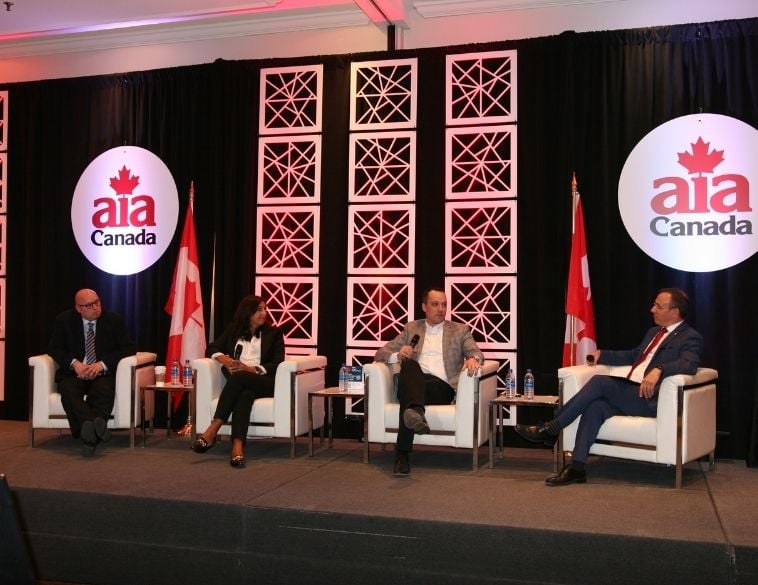Inflation, supply chain disruptions, training, and recruitment, among the key topics featured.
Following AIA Canada’s 2022 Annual General Meeting; was a special State of the Industry panel discussion at the Delta Hotels by Marriott Toronto Airport and Conference Centre.
Moderated by Jean-Francois Champagne, President, AIA Canada, it featured Costa Haitas, President of The Mufflerman, Debbie McCarthy, Global Vice President of Human Resources, Fix Network, and Zara Wishloff, President & CEO, Automotive Parts Distributors.
Key topics on the minds of many at present are inflation and supply shortages, and the panelists provided some very interesting observations on both these subjects.
On top of their game
Zara Wishloff explained that with rapid price increases and often little notice about them, auto parts distributors really need to be on top of their game, in order to navigate through the current market volatility. “If you’re just selling something and running off average costs, you’re going to be in trouble, because you’re basically selling below what your acquisition cost in [today’s market].”
Costa Haitas concurred, noting that margin protection has become a must, in view of wave after wave of price increases. On the flip side, at least when it comes to automotive aftermarket service repair, there is also greater demand, driven by higher prices and low vehicle supply. As a result, many consumers are choosing to hold onto their existing vehicles and investing money in maintenance and repairs.
Yet while the volume of work is there and in many cases growing, ensuring you have the right people to perform it is also proving to be a challenge. Recruiting and retaining staff, as well as providing competitive compensation are all factors service centres need to consider in this inflationary and supply-shortage environment. Haitas said that in spite of all this, The Mufflerman remains committed to providing its employees with a great place to work and motorists a great go-to-resource for their vehicle maintenance and service repair needs.
Debbie McCarthy explained that when it comes to compensation in the labour market today, the current low labour supply means that many organizations are not only struggling to fill positions but are also having to look at total compensation when hiring future staff, not just financial considerations.
When asked about how Canada is fairing against other countries for attracting top talent, McCarthy explained that because Fix Network is a global organization, it uses pay scale data to help determine compensation in different parts of the world. That being said, other factors such as flexible working hours, the ability to work from home and paid leave are all top considerations for employees today, while the labour shortage in many cases is giving potential hires the upper hand when it comes to negotiating for a particular position.
Alleviating the pain
On the parts distribution side, Zara Wishloff explained that with fill rates below 50%, in some cases even as low as 35% in some cases, distributors and parts suppliers need to actively manage their operations to stay ahead of the curve. He cited particular examples regarding air filters, where an operation like Automotive Parts Distributors may still have multiple product lines available, but OEMs and manufacturers may not. Ultimately, he said, parts distributors and suppliers need to focus on alleviating the pain for their automotive service provider customers, by taking a look at what hard parts are available, what they’re able to stock, and when they can ship these items to their ASPs.
Costa Haitas explained that while Superior Tire and The Mufflerman haven’t overall, faced acute hard part shortages, dealing with current supply chain disruptions has required innovative thinking and flexibility to minimize potential issues. “We proactively widened our supply chain network so that we have options in the event of not being able to get parts X, Y, or Z in order to service our customers,” Haitas stated, noting overall, that independent service shops still have the ability to service and maintain the majority of customer vehicles that come in.
The panel discussion also looked at online service in the aftermarket and customer expectations regarding it. Haitas said that while there has been a major increase in online services offered by distributors on the parts side when it comes to service providers, the key is having a robust infrastructure in place that supports seamless, online interaction with customers and not chasing shiny objects.
Online training
Sticking with online activity, virtual training and development have mushroomed since the start of the COVID-19 pandemic. In many cases this has proved to be a huge benefit for both organizations and employees, allowing them access to training options not previously available due to cost, time, and geographical distance. It’s been a huge benefit to many organizations within the aftermarket and Debbie McCarthy noted that in the case of Fix Network—which has embraced virtual training and development on a large scale—it can also serve as a great supplement to in-person events at the network’s training centres.
The panel discussion also covered electric vehicle adoption and how lessons learned from hybrid training, parts, and equipment investment, could prove beneficial to many aftermarket service providers in the coming years, as well as the jobbers and distributors that supply and support them.



